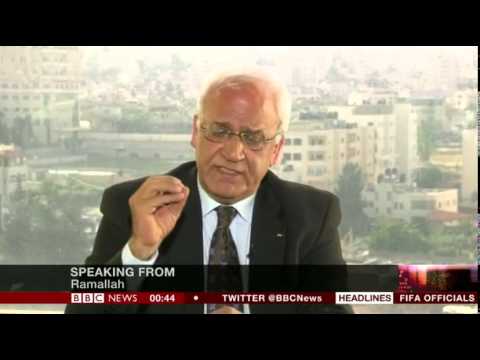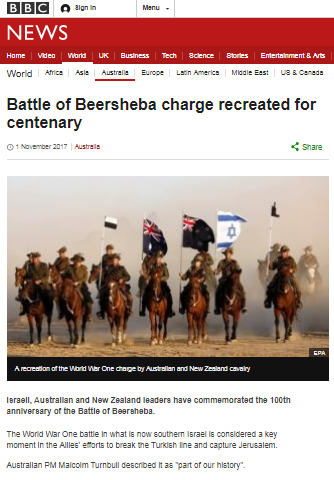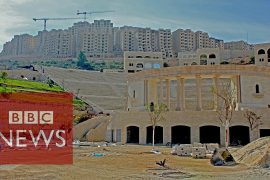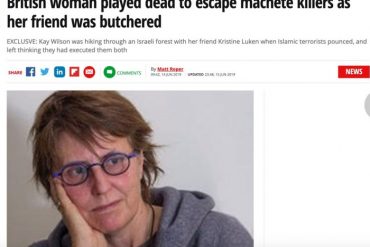The last thing that can be said about the PLO’s chief negotiator Saeb Erekat is that he suffers from a lack of BBC airtime but nevertheless, the end of May saw him back at one of his regular spots – ‘Hardtalk‘.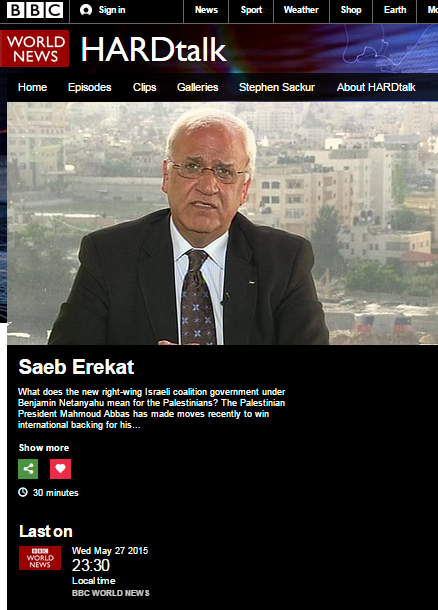
Not only did Erekat have nothing new to tell host Zeinab Badawi, he even recycled statements made during previous appearances on the same programme. At 10:32 in the video below, Erekat says:
“See, in my opinion Christian and Muslim Palestinians will not convert to Judaism and become Israelis. Jews will not convert to Islam and Christianity and become Palestinians.”
If that sounds familiar, that may be because only last year Erekat made a very similar statement during a previous ‘Hardtalk’ interview.
“Are Christian and Muslim Palestinians going to convert to become Israelis? Or are Jews going to convert to Christianity and Islam and become Palestinians? This is not happen.”
And if it rang a bell even in 2014, that could be because back in 2011 Erekat told Zeinab Badawi in yet another ‘Hardtalk’ interview:
“I don’t think Christian and Muslim Palestinians would convert to Judaism and become Israelis. I don’t think that Jews would convert to Islam and Christianity and become Palestinian.”
In other words, for four years at least Saeb Erekat has been pushing the same broken record mantra and not one BBC journalist has bothered to follow it up by informing audiences that not all Israelis are Jews – as the country’s two million strong non-Jewish population (25.1%) indicates – or by asking him why Jews cannot be citizens of a Palestinian state.
Let’s take look at some of the other falsehoods propagated by Erekat – with no disturbance from Badawi – in this programme.
“I have as a Palestinian recognized the State of Israel’s right to exist on the ’67 borders.”
“We recognize them to live in peace and security in the ’67 borders – that’s 78% of historic British mandated Palestine – and accepted to establish our state in the remaining 22% of the land.”
There is of course no such thing as “’67 borders” because the 1949 Armistice Lines were specifically defined as not being borders – as even the BBC’s style guide notes. Nevertheless, Badawi makes no effort to clarify the point to viewers.
“In one week of his government he [Netanyahu] issues more than two thousand housing units of settlements in occupied East Jerusalem and the West Bank. They’re moving their offices – his ministers – to occupied East Jerusalem and today, literally speaking, there are buses in Israel that Palestinians cannot use. They call it sterilized buses and there will be roads that they call sterilized roads.”
Those “East Jerusalem” apartments are in fact located in Ramat Shlomo and have been going through the planning process since 2010. One Israeli minister has approached the Finance Ministry with a request for new offices in Jerusalem. The same ministry has a long existing office in the Sheikh Jarrah neighbourhood of Jerusalem: an area which was classified as no-man’s land throughout the 19 years of the Jordanian occupation of parts of Jerusalem. There are no “sterilized buses” and the restriction on travel for PA registered vehicles on certain small sections of road arises from the very real security issues which of course do not get a mention in this programme at all.
“I’m telling the Israelis if you worry about courts, stop committing crimes. […] I cannot have every two years 12,000 Palestinians killed and wounded in Gaza. I cannot leave the continuation of the settlement activities, by-pass roads – now they call sterilized road – sterilized buses. I cannot continue living a deeper apartheid system in the West Bank and East Jerusalem than the one that existed in South Africa. So what I’m telling the Israelis wake up, wake up. What you’re doing in the West Bank in accordance with the international law – the four Geneva Conventions and the 4th Convention of 1949 – are war crimes.”
Like the vast majority of Palestinians in Judea & Samaria, Saeb Erekat lives under full Palestinian Authority control. The topic of Palestinian self-rule in areas A&B is of course not mentioned at any point in this programme either and Badawi sits idly by as Erekat promotes the false and defamatory notion of a system of ‘apartheid’ worse “than the one that existed in South Africa”.
“I know I have an agreed agenda with them, signed by the Israeli government, saying that permanent status negotiations issues are borders, Jerusalem, water, security. Is Mr Netanyahu willing to utter the sentence two states on the 1967 lines? […] Is he willing to carry out his commitment – not condition – to stop settlement activities in the land that’s supposed to be the State of Palestine?”
“What is between me and the Israelis are elements of contracts, agreements signed. There are obligations emanating from those agreements signed – on me as a Palestinian and on Israel. And Israel must stop settlement activities and must accept two states on 1967 lines and must accept to sit with me to delineate the borders on the basis of the 1967 lines. If they’re willing to honour their commitments we’ll meet tomorrow.”
The “agreements” and “contracts” signed between the Palestinians and Israel are the Oslo Accords. In contrast to the misleading impression given to viewers of this programme, nowhere in those agreements is any restriction placed on building in Israeli towns and villages in Judea & Samaria or Jerusalem and nowhere do they state that the 1949 Armistice Lines – or “67 lines” as Erekat calls them – would be the final borders between Israel and a Palestinian state. That, of course, is precisely why the subject of borders is one of the issues to be discussed in final status negotiations.
“We’re willing to engage seriously on the basis of the agreed terms of reference specified in the Quartet’s statements saying that negotiations should be on the basis of two states on 1967.”
The Quartet’s February 2015 statement makes no mention of “1967” and neither does its 2003 roadmap stipulate that Erekat’s much-touted “1967 lines” are a basis for negotiations.
“The fact that Palestine became and has gained the legal status for observer state meant that it’s a state under occupation. The West Bank, Gaza and East Jerusalem is identified as now as a Higher [sic] Contracting Party to the four Geneva Conventions of 1949. […] Palestine has a status of a state under occupation like what countries like Norway, Belgium, Holland, France, Korea, the Philippines were in the Second World War under German and Japanese occupation [Badawi: sure, sure…] so the Israelis cannot say it’s disputed territories…”
Legal experts contacted by BBC Watch in connection with Erekat’s claim that the 2012 granting of the status of UN non-member observer state automatically confers High Contracting Party status advised us that “neither joining the Geneva Conventions nor receiving observer status in the General Assembly are procedures for assigning territorial sovereignty, and neither action could give “Palestine” sovereignty over the territory of “West Bank, Gaza, and East Jerusalem.”
“Zeinab, settlements in the West Bank including East Jerusalem are illegal settlements. Actually, in accordance with the 4th Geneva Convention these settlements are war crimes.”
That inaccuracy is reinforced by Badawi at 07:45:
“And of course, as you say, international law says that the settlements are illegal.
Once again the BBC breaches its own editorial guidelines on impartiality by failing to inform audiences of the existence of legal opinions which disagree with the politically partial line it chooses to promote.
Were viewers of this programme provided with factual information which would aid them in building an “understanding of international issues“? Regrettably, no. Were they provided with unchallenged misinformation in breach of BBC editorial guidelines on accuracy and impartiality? Unfortunately, yes. That, however, is par for the course in any BBC content featuring Saeb Erekat.
Related Articles:
BBC’s Hardtalk provides platform for Saeb Erekat’s fabricated histories – part one
BBC’s Hardtalk provides platform for Saeb Erekat’s fabricated histories – part two
Resources:

